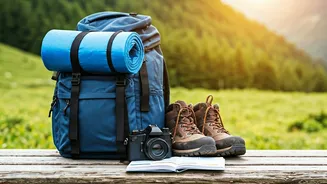Choosing Your Destination
India's diverse terrain presents an array of travel possibilities. Consider your interests when selecting destinations. For history enthusiasts, cities
like Delhi, Agra, and Jaipur offer rich historical sites and architectural marvels. Nature lovers can explore the Himalayan regions or the tropical backwaters of Kerala. Determine the purpose of your trip before deciding on a destination. Evaluate weather patterns and the ideal time of year to visit, especially if you are traveling to a specific region. Research different activities available at your chosen location and establish a realistic budget before finalizing your travel plans. Be aware of local festivals and events that can shape your journey.
Budgeting Your Trip
Budgeting is crucial for any successful travel plan. Begin by estimating travel expenses, including transportation, accommodation, meals, and activities. Consider various modes of transport, from budget-friendly options like buses and trains to more expensive alternatives such as flights or private cars. Accommodation costs vary widely based on your preferences and location, with options ranging from budget hostels to luxury hotels. Factor in the cost of food, which can vary depending on where and how you eat. Plan some funds for activities, entrance fees, and local transportation. Always keep some extra money aside for emergencies and unexpected costs that might arise during the journey. This thorough approach to budgeting will help you avoid financial stress and ensure an enjoyable travel experience.
Accommodation Essentials
India offers a diverse range of accommodations, each catering to different budgets and preferences. Booking accommodations in advance, especially during peak season, is always recommended. Research different types of accommodations like hotels, guesthouses, homestays, and hostels. Consider reading reviews to get insights into experiences from previous guests and to better choose your stay. Ensure that the accommodation is conveniently located near your desired attractions and has access to necessary amenities. When choosing a stay, consider amenities, location, and budget. Always review and understand the cancellation policies, just in case your plans alter.
Transportation Around India
Navigating transportation within India can be an adventure itself. Several transportation options exist, from air travel, which is quicker but can be costly, to train travel, which can be an economical and scenic option. Consider booking train tickets well in advance, especially for popular routes and during peak travel periods. Local buses are often the most affordable way to travel between cities, although they may not be the most comfortable or efficient. Ride-sharing services and taxis are available in many cities but ensure these are verified services to travel safely. For shorter distances, consider auto-rickshaws or cycle-rickshaws for a taste of local life. Always negotiate prices beforehand. Factor in travel time when planning your itinerary.
Safety and Health
Prioritizing your safety and health should be paramount while traveling in India. Before your trip, make sure you have all necessary vaccinations. Pack a basic first-aid kit with medications for common ailments, along with any personal medications. Drink bottled water and eat at reputable places to avoid food and waterborne illnesses. Be aware of your surroundings and take precautions to safeguard your belongings. Avoid walking alone in poorly lit areas, especially at night. Inform a reliable person of your travel plans and keep them updated on your whereabouts. Familiarize yourself with local emergency numbers, and consider purchasing travel insurance that covers medical emergencies, and any lost or stolen items.
Cultural Sensitivity
Respecting local customs and traditions is fundamental for a positive experience in India. Dress modestly, especially when visiting religious sites. Remove your shoes before entering temples and other places of worship. Ask for permission before taking photographs of people, especially in more rural areas. Always use your right hand when receiving or giving something, as the left hand is often considered unclean. Show respect for elders and be mindful of your tone. Learn a few basic phrases in the local language; it will be greatly appreciated. Engage with the locals respectfully. Participating in local festivals and events can also enrich your understanding of Indian culture and customs.
Packing Essentials
Packing efficiently is important for comfortable travel. Pack light, especially if you plan to move between multiple destinations. Include versatile clothing items suitable for various weather conditions and cultural norms. Pack comfortable walking shoes, and any necessary medications. Don't forget essentials such as sunscreen, insect repellent, and a hat to protect yourself from the sun. Include a universal adapter for charging your electronic devices. A basic first-aid kit can also come in handy. Keep a copy of your passport and other important documents separate from the originals, in case they get lost or stolen. Carry a reusable water bottle to stay hydrated and reduce plastic waste.














